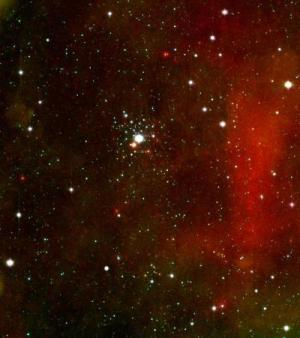Jupiter gains weight quickly when young. It is required to do so because the material from which Jupiter formed disappears after only a few million years, according to a new study of planet formation around young stars.
Smithsonian astronomers studied the 5-million-year-old star cluster NGC 2362 with NASA's Spitzer Space Telescope, which can detect the signatures of planets forming in infrared light. They found that all stars with masses like the Sun or larger lose planets. Only a few stars smaller than the Sun retain the planet-forming disks. These discs provide materials for the formation of giant gas planets like Jupiter.Therefore, gas planets must form in less than 5 million years or they will not form.
 The image from NASA's Spitzer Space Telescope shows the young star cluster NGC 2362. By studying this cluster, astronomers have discovered that the formation of giant gas planets happens very quickly. , within 5 million years, means that planets like Jupiter develop spontaneously when young. (Photo: NASA / JPL-Caltech / T. Currie (CfA)) Researcher Thayne Currie of the Harvard-Smithsonian Center for Astrophysics said: 'Although astronomers have discovered hundreds of onions. Jupiter-like crystals around other stars, our results show that such planets need to form very quickly. The process responsible for forming Jupiter-like planets must be particularly effective . ' Currie presented the team's findings at a meeting of the American Astronomical Society in Long Beach, Calif.
The image from NASA's Spitzer Space Telescope shows the young star cluster NGC 2362. By studying this cluster, astronomers have discovered that the formation of giant gas planets happens very quickly. , within 5 million years, means that planets like Jupiter develop spontaneously when young. (Photo: NASA / JPL-Caltech / T. Currie (CfA)) Researcher Thayne Currie of the Harvard-Smithsonian Center for Astrophysics said: 'Although astronomers have discovered hundreds of onions. Jupiter-like crystals around other stars, our results show that such planets need to form very quickly. The process responsible for forming Jupiter-like planets must be particularly effective . ' Currie presented the team's findings at a meeting of the American Astronomical Society in Long Beach, Calif.
Although most planet-forming disks in NGC 2352 disappear, some stars in the cluster have 'broken disks', indicating that ice or planet planets like Earth, Mars, or Pluto can still form.
The co-author Scott Kenyon explains: 'The Earth started its pre-formation process, but Jupiter completed it first, thanks to its spontaneous development.'
Kenyon added that while the Earth needs 20 to 30 million years to reach its maximum mass, Jupiter grows fully within 2 to 3 million years.
Previous studies have shown that planetary disks disappear within 10 million years.These new findings set new limits on time that allows giant gas planets to form around stars.
 Van Allen's belt and evidence that the Apollo 11 mission to the Moon was myth
Van Allen's belt and evidence that the Apollo 11 mission to the Moon was myth The levels of civilization in the universe (Kardashev scale)
The levels of civilization in the universe (Kardashev scale) Today Mars, the sun and the Earth are aligned
Today Mars, the sun and the Earth are aligned The Amazon owner announced a secret plan to build a space base for thousands of people
The Amazon owner announced a secret plan to build a space base for thousands of people Chilling discovery of cosmic object that almost brought the Earth to 'apocalypse'
Chilling discovery of cosmic object that almost brought the Earth to 'apocalypse'  Admire 7 planets in the Solar System appearing at the same time in the night sky
Admire 7 planets in the Solar System appearing at the same time in the night sky  Does the Solar System have 5 more planets similar to Earth?
Does the Solar System have 5 more planets similar to Earth?  New discovery: 7 Earth-like planets that could be habitable
New discovery: 7 Earth-like planets that could be habitable  6 habitable planets discovered at the same time
6 habitable planets discovered at the same time  Strange Phenomenon: Why Are Planets 'Running Away' From the Sun Despite Their Extremely Strong Gravitational Force?
Strange Phenomenon: Why Are Planets 'Running Away' From the Sun Despite Their Extremely Strong Gravitational Force? 